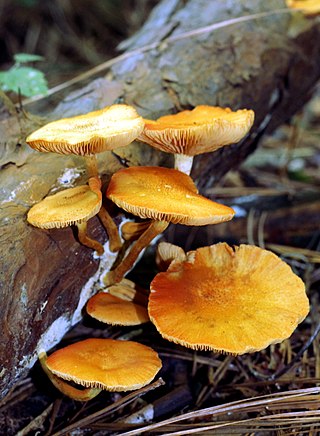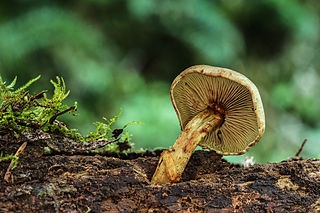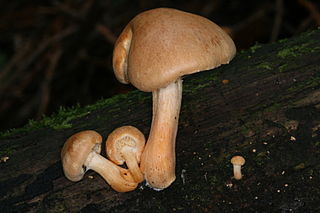
Gymnopilus junonius is a type of mushroom-forming fungus in the family Hymenogastraceae. Commonly known as the spectacular rustgill, this large orange mushroom is typically found growing on tree stumps, logs, or tree bases. Some subspecies of this mushroom contain the neurotoxic oligoisoprenoid gymnopilin.

Gymnopilus aeruginosus, also known as the magic blue gym, is a mushroom-forming fungus that grows in clusters on dead wood and wood chip mulch. It is widely distributed and common in the Pacific Northwest. It has a rusty orange spore print and a bitter taste and contains the psychedelic chemical psilocybin. It was given its current name by mycologist Rolf Singer in 1951.

Gymnopilus purpuratus is a species of agaric fungus in the family Hymenogastraceae. It grows in clusters on dead wood, tree stumps and wood chip mulch. It is widely distributed and has been recorded in Argentina, Australia, Chile, New Zealand, the UK and Germany. It has a broadly convex cap covered in small dry reddish-brown scales, a stout yellow stem beneath reddish brown, wine-red to purple vertical fibres, and a thick rusty orange spore print.

Gymnopilus braendlei is a species of agaric fungus in the family Hymenogastraceae that contains the hallucinogens psilocybin and psilocin. It was originally described by mycologist Charles Horton Peck as Flammula braendlei, from specimens found in the District of Columbia in 1902.
Gymnopilus aculeatus is a species of mushroom-forming fungus in the family Hymenogastraceae. Originally described in 1890 as a species of Pholiota, it was transferred to genus Gymnopilus by mycologist Rolf Singer in 1951.
Gymnopilus abramsii is a species of mushroom-forming fungus in the family Hymenogastraceae. It was first described by American mycologist Murrill in 1917. The epithet abramsii commemorates LeRoy Abrams.
Gymnopilus armillatus is a species of mushroom-forming fungus in the family Hymenogastraceae.
Gymnopilus fuscosquamulosus is a species of mushroom-forming fungus in the family Hymenogastraceae.
Gymnopilus mitis is a species of mushroom-forming fungus in the family Hymenogastraceae.

Gymnopilus underwoodii is a species of agaric fungus in the family Hymenogastraceae. Originally described in 1896 by Charles Peck as Flammula underwoodii, the fungus was given its current name by William Murrill in 1917. The specific epithet honors American mycologist Lucien Underwood.
Gymnopilus terrestris is a species of agaric fungus in the family Hymenogastraceae.
Gymnopilus rufosquamulosus is a species of mushroom-forming fungus in the family Hymenogastraceae.
Gymnopilus rufobrunneus is a species of mushroom-forming fungus in the family Hymenogastraceae.

Gymnopilus rufescens is a species of mushroom-forming fungus in the family Hymenogastraceae.

Gymnopilus punctifolius is a species of mushroom in the family Hymenogastraceae found in North America.
Gymnopilus intermedius is a species of mushroom-forming fungus in the family Hymenogastraceae. It was described by mycologist Rolf Singer in 1951.
Gymnopilus lutescens is a species of mushroom-forming fungus in the family Hymenogastraceae.

Gymnopilus hybridus is a species of agaric fungus in the family Hymenogastraceae.
Bondarzewia guaitecasensis is a species of polypore fungus in the family Russulaceae that is found in South America. Originally described as Polyporus guaitecasensis by German mycologist Paul Christoph Hennings in 1900, it was transferred to the genus Bondarzewia by Jorge Eduardo Wright in 1964. The fungus is parasitic on species of Nothofagus.








